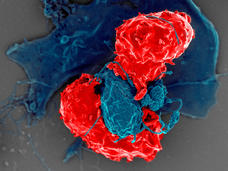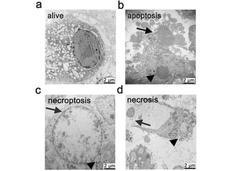Cancer Currents: An NCI Cancer Research Blog
A blog featuring news and research updates from the National Cancer Institute. Learn more about Cancer Currents.
-
Building on Success, Maximizing Opportunities: NCI’s Annual Plan & Budget Proposal
NCI Acting Director Douglas Lowy, M.D., discusses the institute’s Annual Plan & Budget Proposal for Fiscal Year 2021, which includes the institute’s professional judgement on the funding required to make the most rapid progress against cancer.
-
Altering Diet Enhances Response to Cancer Treatments in Mice
A new NCI-supported study showed that altering cancer cell metabolism by feeding mice a diet very low in the nutrient methionine improved the ability of chemotherapy and radiation therapy to shrink tumors.
-
Pembrolizumab Approved for Some Patients with Advanced Esophageal Cancer
FDA has approved the immunotherapy drug pembrolizumab (Keytruda) to treat some patients with advanced esophageal cancer. Patients must have certain levels of the protein PD-L1 on their tumors, as determined by an FDA-approved test.
-
Study Tests Immunotherapy in People with Cancer and Autoimmune Diseases
An NCI-funded clinical trial is testing the immunotherapy drug nivolumab (Opdivo) in people who have advanced cancer and an autoimmune disease, such as rheumatoid arthritis, lupus, or multiple sclerosis, who are often excluded from such trials.
-
Newly Discovered ‘Don’t Eat Me’ Signal May be a Target for Cancer Immunotherapy
Researchers have identified a protein called CD24 that may be a new target for cancer immunotherapy. The protein is a ‘don’t eat me’ signal that prevents immune cells called macrophages from engulfing and eating cells.
-
The Childhood Cancer Data Initiative: Transforming the Pediatric Cancer Landscape through Sharing Data
To prepare for the proposed Childhood Cancer Data Initiative, NCI sponsored a 3-day symposium that brought together pediatric cancer researchers, advocates, and other stakeholders.
-
MGUS to Myeloma: Study Suggests Risk of Progression Can Change
A person’s risk of progressing from a benign condition called monoclonal gammopathy of undetermined significance (MGUS) to the blood cancer multiple myeloma can change over time, according to a new study.
-
Targeted Drug Erdafitinib Benefits Some Patients with Advanced Bladder Cancer
New clinical trial findings confirm that the targeted therapy erdafitinib (Balversa) can benefit patients with advanced bladder cancer whose tumors have a genetic alteration in one of the four FGFR genes.
-
Study Suggests Reviewing Lung Cancer Screening Criteria for African Americans
Clinical recommendations on who should be screened for lung cancer may need to be reviewed when it comes to African Americans who smoke, findings from a new study suggest.
-
Could A Form of Cell Death Enhance Cancer Immunotherapy?
Injecting cells undergoing necroptosis, a form of cell death, into tumors in mice kickstarted an immune response against the tumors, researchers have found. When combined with immunotherapy, the treatment was effective at eliminating tumors in mice.
-
Laser-Based Device Detects and Kills Melanoma Cells in the Blood, Study Finds
Researchers have developed a device that uses lasers and sound waves to scan circulating blood for melanoma cells. In a small study, the device accurately detected and reduced the amount of cancer cells in participants’ blood.
-
Metastatic Colorectal Cancer May Spread Early in the Disease, Study Finds
Many colorectal cancers likely have spread long before the original tumor is detected, researchers have found. The findings suggest the need for very early detection and could help identify patients who need more aggressive systemic treatments.
-
Improving Cancer Immunotherapy: Overcoming the Problem of ‘Exhausted’ T Cells
Researchers have identified proteins that may play a central role in transforming T cells from powerful destroyers to depleted bystanders that can no longer harm cancer cells. The findings could lead to strategies for boosting cancer immunotherapies.
-
Can Some Women Treated for Endometrial Cancer Forgo Radiation after Surgery?
Some women with endometrial cancer may be able to receive less intensive treatment, chemotherapy and no radiation, without increasing their risk of the disease recurring within 5 years, according to the results of a randomized clinical trial.
-
Helping Dogs—and Humans—with Cancer: NCI’s Comparative Oncology Studies
Did you know that NCI supports clinical trials of new treatments for pet dogs with cancer? Learn more about NCI’s comparative oncology studies and how they may also help people with cancer.
-
New on NCI Websites for July 2019
NCI periodically provides updates on new websites and other online content of interest to the cancer community. See selected content that has been added as of July 2019.
-
Trial Highlights Complexities of Targeted Therapy for Pancreatic Cancer
Olaparib (Lynparza) may be beneficial for some people with advanced pancreatic cancer who have inherited mutations in the BRCA1 or BRCA2 genes, according to results from the POLO trial.
-
More Treatment Options Emerging for Some Men with Metastatic Prostate Cancer
In two large clinical trials, the drugs enzalutamide (Xtandi) and apalutamide (Erleada), respectively, combined with the androgen deprivation therapy, improved the survival of men with metastatic prostate cancer that still responds to hormone-suppressing therapies.
-
Combination Therapy with Venetoclax Approved for Chronic Lymphocytic Leukemia
The Food and Drug Administration has approved venetoclax (Venclexta) in combination with obinutuzumab (Gazyva) for the initial treatment of adults with chronic lymphocytic leukemia or small lymphocytic lymphoma.
-
Researchers Turn On PTEN Tumor-Suppressor Protein in Cancer Cells
Researchers have discovered a potential way to turn on one of the most commonly silenced tumor-suppressor proteins in cancer, called PTEN. They also found a natural compound, I3C, that in lab studies could flip the on switch.



















